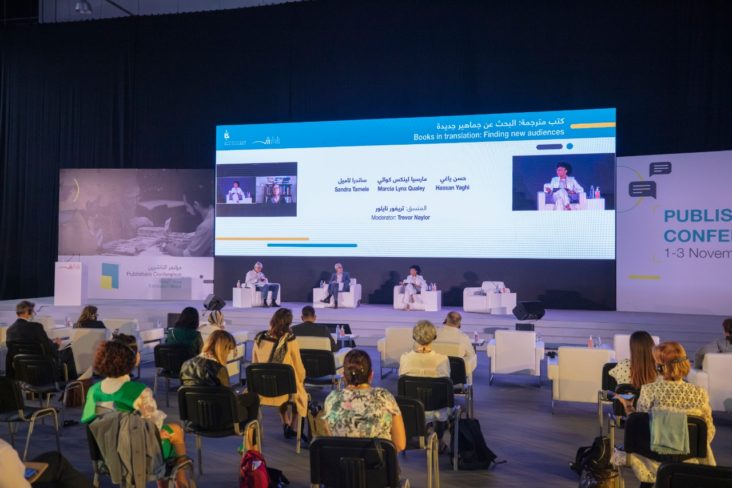Sharjah Is The Official Starting Point For The Global Book Industry To Get Back To Business; Publishers Conference Attendees Say

The inaugural day of the 10th Publishers Conference today (Sunday) in the lead up to the 39thSharjah International Book Fair has been symbolic of a fresh start for the global publishing fraternity, as 317 professionals and 33 speakers reunite in what is a first-of-its-kind global gathering of industry professionals since the Coronavirus (Covid-19) pandemic led to cancellations of some of the biggest book events internationally this year.
The formal proceedings of the three-day conference organised by Sharjah Book Authority (SBA), begun withHE Ahmed bin Rakkad Al Ameri, Chairman, SBA, extending warm welcome to both in-person and virtual attendees, saying: “Our meeting today is an exceptional one because we are among global pioneers dedicated to developing a brand new model of hybrid events. Until corona ends.”
“Through this conference, which is yet another opportunity to explore meaningful collaborations and partnerships, SBA renews its commitment to Sharjah’s cultural enterprise established by His Highness Sheikh Dr. Sultan bin Muhammad Al Qasimi, Member of the Supreme Council and Ruler of Sharjah. We are here to support everyone in the creative industries,” Al Ameri added, emphasising to the attending publishers that the conference is being held to ensure that the industry can continue to strengthen their response to the current crisis and work collectively to fortify the book industry’s future in the post-Covid19 era.
Virtually addressing the attendees, Perminder Mann, CEO, Bonnier Books UK, made some significant observations in her keynote address. “With several brick and mortar shops closed during lockdown for a considerable part of this year, and footfall lower than normal, we do understand that the book retail landscape will be quite different starting next year,” she said, adding: “For the UK market, things have been quite okay for most parts of the business this year, while the global book shop sector and our global publishing partners have taken a hit, especially territories across South East Asia, India, and Latin America. However, it’s been encouraging to see signs of early recovery, particularly in the US markets.”
Sharjah conference hailed as starting point for publishers to get back to business post Covid-19
The inaugural proceedings were followed by the first panel session of the three-day conference. Titled ‘Global publishing spotlight: Surviving and thriving during a pandemic’, the discussions were led by Lisa Milton, Executive Publisher, HQ and Mills & Boon (UK); Nicolas Roche, Managing Director, BIEF (France); Ravi DeeCee, CEO, DC Books (India); Sherif Bakr, Director, Dar Al Arabi for Publishing and Distribution (Egypt); and moderated by Jacks Thomas, International Book Industry Consultant (UK).
The panel offered a global perspective on the aftereffects of the pandemic on book industries represented by participating speakers, and what they have each done to keep up with the pace of change heralded by Covid-19.
“It is fantastic to be at a book fair to be honest. We’ve missed most of them this year,” said Thomas to her audience, adding: “At a time when change has accelerated at a phenomenal pace, and we’ve been catapulted into different ways of sharing knowledge, communicating and doing business, the big question is how will publishers find stability and continuity in this new normal.”
Addressing the moderator’s question virtually, Lisa Milton, opined:“One of our strongest focus areas being adult trade publishing, the biggest challenge always is discoverability. Previously, we have pushed this agenda through bookshops, journalists, radio,fairs and literary festivals, etc. With the onset of the pandemic, however, we lost many of these platforms – had to move away from broadcast sales to dialogue platforms on social media to connect with our readers and continue our quest for discoverability.”
“What I’ve really tried to do is simply keep publishing, because what we have learnt is that books matter regardless of our circumstances. Therefore, getting books into the hands of the readers is pivotal, and is what will keep your business going. Finally, the most important aspect is to figure out your unique formula for discoverability; to connect – books with its readership,” she advised.
Sharing the ongoing challenges faced by the French book industry since the first nationwide lockdown was imposed in March, Nicolas Roche said: “It was very difficult for us to work until May. Between June until now,we understood the pandemic better, worked around it, sales picked up and we did quite well.”
He further added: “We looked forward to resuming a full relationship with the reader, but we are facedwith uncertainty once again. While November and December are two months that usually witness sizeable book sales, we are not sure if the trend will continue this year. Ultimately, what we need is solidarity. We need to be able to meet again, for real – notonly for B2B meetings, but meet readers during fairs and speak about our projects. I look forward to that day.”
India’s Ravi DeeCee opined that during the pandemic, readership has grown in India.“We’ve seen a major revival of reading throughout our nation; people catching up on decades of reading during the 45-day lockdown.”
“Mid-February, we were absolutely sure that a lockdown was looming upon us. Our digital and eBooks department braced for this unprecedented event, and we announced free download of books for a single day in March. This resulted in 100,000 free downloads in a day’s time. We requested the Kerala Govt to keep the book shops open during the lockdown phase, when only groceries, pharmacies, and essential services were allowed to operate. They agreed, allowing some book shops to sell, few days a week, which brought us sales at a time we least expected,” he added.
Egypt’s Sherif Bakrstated that the publishing industry in Egypt suffered a huge hit as a series of regional and international book fairs were cancelled since early March, saying these have traditionally been the main selling windows for local literary merchandise. “This has meant either very little or no sales at all for our publishers since the Muscat International Book Fair 2020; we hope SIBF 2020 will bring some relief to our publishers. Let’s hope Sharjah will be the starting point for publishers to get back to business.”
Delving into the question on how the Egyptian book market has responded to the sudden and sweeping restrictions introduced by Covid-19, Sherif said: “We’ve sold eBooks and audiobooks; many publishers who did not have websites have now created them to connect with readers and other stakeholders. They also started to work on digital marketing, began to understand that it’s not just about posting titles online – it is much more. The highlights for the local market have been the sales of audiobooks and the new job opportunities have been created as a result of this pandemic.”
Digital, physical or hybrid? What is the ideal route publishers must take to reach audiences?
In the second session titled ‘Publishing pivoting for the future: How virtual events and social media are connecting publishers and readers across the globe’, moderated by Jason Bartholomew, CEO, Midas (UK), panelistsGvantsaJobava, Editor/International Relations Manager, Intelekti Publishing (Georgia); Judith Curr, President and Publisher, HarperOne, Amistad, and Rayo – HarperCollins (US); and Khoula Al Mujaini, General Coordinator, SIBF, threw light on successful campaigns being organised by publishers and authors in their respective markets to connect with readers.
The third and final talk of the day, ‘Books in translation: Finding new audiences’, engaged publishing professionals from across three markets in MENA to discuss the current state of the translations business in the post pandemic era. The discussions led by Hassan Yaghi, Editorial Director, Dar al-Tanweer (Lebanon); Marcia Lynx Qualey, Founding Editor, ArabLit (Morocco); Sandra Tamele, Founder and Editor, EditoraTrinta Zero Nove (Mozambique); and moderated by Trevor Naylor, Associate Director, AUC Press/AUC Bookstores/Rights (Egypt), highlighted the need to boost the tools and resources available to the translations industry in the region, not only to tap into the region’s untapped commercial potential but also promote cross-cultural understanding by making Arabic literature more readily available to readers around the world.
The 10th Publishers Conference will continue today (Monday) and tomorrow, with a packed programme of discussions and debates, allowing attendees to look into ways they can work collaboratively and chart a clear course ahead for the industry. The 11-day Sharjah International Book Fair will follow, opening on Wednesday with a hybrid online – offline cultural programme.



